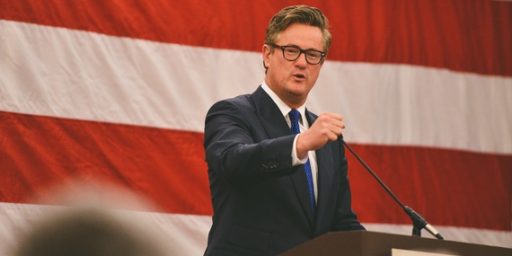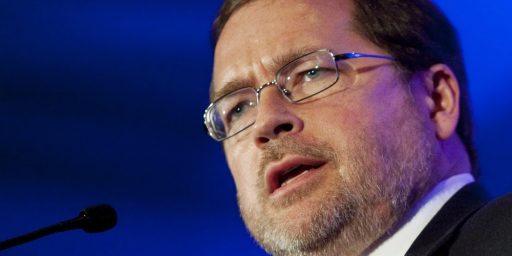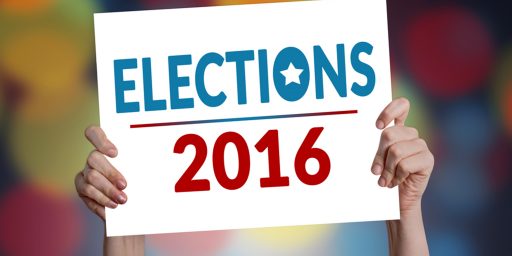Joe Scarborough Answers the “Is our Pundits Learning?” Challenge
Seems that the answer continues to be "no."
 Joe Scarborough famously said the following before the election:
Joe Scarborough famously said the following before the election:
“Nate Silver says this is a 73.6 percent chance that the president’s going to win. Nobody in that campaign thinks they have a 73.6 percent — they think they have a 50.1 percent chance of winning.
…. Anybody that thinks that this race is anything but a tossup right now is such an ideologue [that] they should be kept away from typewriters, computers, laptops, and microphones for the next ten days, because they’re jokes.”
The problem was, of course, that Scarborough was here ignoring the fact that Silver’s models were based on polling (i.e., actual data) and not ideology as well as the structural conditions created by the electoral college. Further, his statements revealed a rather remarkable lack of understanding of basic mathematical concepts, such as probability.
However, since Silver’s model (and, perhaps more importantly, the polling data) ended up being on target, Scarborough has had to issue an apology of sorts. He does so in a Politico column entitled My (semi) apology to Nate Silver.
He starts off rather, well, unapologetically:
If you are blessed enough to be able to avoid political chatter on Twitter, you may not know that Silver became a sort of Maharishi Mahesh Yogi for liberals seeking peace and serenity during the turbulent 2012 presidential campaign. Just as the Beatles had the Maharishi to guide them through the tough times after the death of their manager Brian Epstein, progressives had Silver’s New York Times blog to comfort them after the first presidential debate.
On the one hand, I will allow that there were a lot of folks on the Obama side of the ledger who looked to Silver like he was magical. Of course, on the other, when one is having to admit one was wrong, perhaps snark is not the place to start.
However, that really isn’t the important aspect of this discussion. That some people looked to Silver to make themselves feel better does not detract from the fact that what is important about Silver’s approach is not who he was showing as the leader, but the methods by which he arrived at those conclusions. This is the part that Scarborough seems not to have learned.
To wit:
I had been through enough political campaigns to know that predicting the outcome of any election with numerical certainty was tricky business — especially in a presidential campaign that had been in flux since that first debate. More to the point, predicting an outcome to the nearest thousandth of a decimal point several weeks out seemed like a fools’ errand (and still does.) After my critique, liberals pounced on my claim from the left as conservatives bristled from the right when I mocked their conspiracy theories about “biased” media polls.
This strikes me as an appeal to experience and gut feelings over data. Beyond, it is not all that much of departure from his original “toss up” comments that started all of this in the first place.
As apologies go, the following is more than a little, well, not apologetic:
Since the president’s reelection, liberals have been cluttering my Twitter feed with demands that I apologize to Nate for dismissing his 74.8374629% prediction in October that Barack Obama would win. I have ignored those requests because as is usually the case for ideologues on Twitter, their rage is unfocused and based in ignorance. These critics conveniently forget that I consistently predicted an Obama win throughout the year and even said on Election Day that the president’s stubborn lead in swing state polls would doom Romney.
I won’t apologize to Mr. Silver for predicting an outcome that I had also been predicting for a year. But I do need to tell Nate I’m sorry for leaning in too hard and lumping him with pollsters whose methodology is as rigorous as the Simpsons’ strip mall physician, Dr. Nick. For those sins (and a multitude of others that I’m sure I don’t even know about), I am sorry.
First, the issue really isn’t about who predicted what, but how they did so.
Second, Silver wasn’t just right about the winner, he was remarkably accurate at the state level.
Third, and on the same theme, the criticism of substance that is aimed at Scarborough is from those who find his lack of understanding of basic probabilities (as exemplifies by the Atlantic Wire’s piece: People Who Can’t Do Math Are So Mad At Nate Silver) not because of ideological preferences. It does not seem to me that Scarborough has learned that lesson.
In terms of an actual apology, the column falls quite short (just go read the original quote again and compare it the content of the column).






Personally I’d rather see our pundits spend far, far less time focusing on the horse race in political campaigns, whether they get their number from polls, Nate Silver, or their own intuition.
@Doug Mataconis: I take the point. However, I would go a step further and note that a more dispassionate and analytic look at the numbers is what we need. The original Scarborough quote is quintessential horse race of the worst kind: casting the race as neck and neck because that makes for a better story than a real reading of the numbers would suggest.
@Steven L. Taylor:
The media being the media, the Nate Silver episode will just lead them to focus more on the numbers which is, when you get down to it, the least important part of an election campaign.
@Doug Mataconis: Oh, I dunno. The numbers end up deciding the race, which is rather important!
Further, the numbers help us understand how the population is reacting the campaigns.
The numbers are extremely important.
The numbers themselves are far more important than the outrage/gaffe of the day coverage, the horse race style, and the attempt to bring every event that happens in the world (“serial murderer discovered in Yemen, does this hurt Obama?”) back to the election.
Actually, the race decides the numbers. Which is not to say the numbers aren’t important. They tell us what the race actually is at that point and, with Silvers’s model, tell us where it is likely to go.
Yes, Joe Scarborough has shown he’s too innumerate to have a clue that what Nate Silver does is completely different from what he does. Joe has no idea that it’s numbers first, then result, that if the numbers came out Romney, Silver would have said Romney.
I’ver commented before – How can anyone as dumb as Joe Scarborough be as arrogant as Joe Scarborough? A question that answers itself.
@SKI:
My point is: at the end of the day the race is decided by votes, i.e., numbers.
@Doug Mataconis:
But I don’t know if it’s really that easy to parse everything. Because the things that matter to campaign political reporting are “gaffes” and such. At least the numbers give us the evidence as to whether or not these things matter in any real sense. It’s not that the numbers in and of themselves are important, it’s that they show the lie of campaign reporting in general.
I believe the problem here lies with the line between being an entertainer and being a political analyst, that is, someone with expertise or insight into our political environment.
Joe is hired to both entertain and inform, and when too much weight is given to entertainment and pandering to a specific audience, and too little to “political science” then you end up with the massive NASCAR-like spin-outs and crashes among the conservative talkocracy that we witnessed 2 weeks ago.
Joe is usually okay in regard to this stuff, others who don’t normally spin out – George Will – decided to go all in on “the analysis is biased”.
@Doug Mataconis:
Um. The time “it’s math” came up before this was on tax and budget.
Think about it.
@Console:
I’d argue that the actual issues matter far, far more than who happened to be leading in Iowa on August 23rd.
@Doug Mataconis:
Without polling, all we can use to judge the reaction of the public to the campaigns are the guts and hunches of the pundits.
@Doug Mataconis:
Campaigns are an exercise in marketing and advertising. I mean, could you really pinpoint Romney’s true position with any precision on any major issue? The media is sort of out gunned on things like this, so I get why they resort to horse race coverage. At least with polling, we can figure out what people really do care about instead of constructing narratives out of whole cloth.
@Steven L. Taylor:
But how much does it really matter “how the public is reacting”? I’m really beginning to think that political coverage is far too focused on polling and probabilities.
A pundit who actually admitted error would be a genuine novelty.
These guys are hired to be smarter than their audience. But not much smarter or they lose the audience. And not too much at variance or they lose the audience. So a given pundit has to be within, let’s say, 10% of his audience at the outside.
If your audience is stupid – and we’re talking conservative audiences – then the pundit can never be more than slightly smarter. Scarborough, by virtue of being on MSNBC, gets a slightly less dumb audience than, say, Hannity or Limbaugh. But that still leaves him shackled to stupid.
Or, to sum up:
Current political coverage = “You didn’t build that” vs. “47 percent”
I at least feel like I’m learning something when I read poll analysis.
@Doug Mataconis:
Umm, well, because, the manifestation of those reactions, ultimately is voting.
Also: actually having evidence over hunches is always better,
I really don’t see the objection to more information.
(Now, granted, the polling data could be a covered quite a bit better than it is, which is my broader point).
@Steven L. Taylor:
I can see how that information is useful to campaigns. I’m not sure it’s very useful to the average voter.
I know I tried to make the point before, but repetition is the soul of the internet …
It is wrong to think that rejection of fact, in this case of pundits versus Silver, is unique or not characteristic of a wider problem. It is the “fact based reality” problem.
Weird that it has a name, right?
There are a group, raised on core beliefs of fundamentalism and science denialism, who can pull a trick at any time. Do I not like the way data is going? No problem, I’ll just flip to a faith based view.
@Doug Mataconis:
What is negative about more information? And, better yet, empirical information?
I see no downside.
It isn’t as if the quality of the coverage of the campaigns would diminish with less data available.
@Doug Mataconis:
And it matters because it is “contact with reality.”
If you don’t require talking heads to be real, they’ll be unreal, on any topic.
@john personna: Exactly. This is all part of a broader issue.
@Steven L. Taylor: Prior to Election Day, we don’t know those numbers. All we have is the polling (or, near the end, what the early voting patterns are).
Pundits are paid to make their particular audience feel good by confirming their biases. With a few exceptions*, being right is no part of what their audience or their employers want.
* I hesitate to name names for reasons I expect will soon become obvious, but Silver obviously, and Paul Krugman bases his columns on numbers and models; and both seem to have an audience who want factual input. Somehow it seems to work out that Colbert’s famous remark was right.
I see Joe also lied about his own record in the “apology”, by saying he predicted an Obama win all along:
On Politico:
“But my gut tells me there are two likely scenarios: (1) President Obama will squeak out a narrow Electoral College victory or (2) Mitt Romney will carry Ohio and be swept into office by a comfortable margin.
After practicing politics for 20 years, I suppose I would rather be in Mitt Romney’s shoes than Barack Obama’s. Incumbents who are under 50 percent two weeks out usually go down to defeat.”
@SKI: Yes, I realize. But these numbers are all linked. They do not exist in a vacuum separated from one another.
Joe Scarborough has been hosting his relatively informative and intelligent morning Joe talk show for so long now, that I think people sometimes forget that he was a Conservative Congressman from the Florida panhandle. By that standard, even when he has these “cranky” moments, he’s still fairly reasonable and sane in comparison.
@Steven L. Taylor:
Again, when the media focuses on the horse race to the exclusion of all else, they are doing a disservice to the public in my opinion. Pollsters and people like Nate Silver are useful to some extent, but our political coverage in most of the media treats elections and tends to focus almost exclusion on “who’s ahead” to exclusion of pretty much everything else.
“The source of the term [ reality-based community] is a quotation in an October 17, 2004, The New York Times Magazine article by writer Ron Suskind, quoting an unnamed aide to George W. Bush (later attributed to Karl Rove):”
I was not aware that this famous quote had later been attributed to Rove. It definitely captures the pundit vs. analysts divide. The pollsters are explicitly making “judicious study of discernible reality.”
@Doug Mataconis:
I think if you actually asked that public, they’d rank “who’s winning?” as one of their main interests.
@Doug Mataconis:
Yes, but that is an argument for better and more detailed examination of the numbers, not an argument that we should look less at the numbers.
Joe Scarborough is and always has been a douchebag. If our pundits were learning, Bill Kristol would be sleeping under a bridge. That column is not worth the pixels it was printed on.
@john personna: I always thought that quote came from Cheney.
Out of curiosity and since I don’t watch Morning Joe, how often does Scarborough have pundits on his program, like George Will, who said that Romney was going to win in an Electoral College landslide?
Until now, the horserace coverage that crowded out more substantive coverage has been based on gut feelings and leg tingles.
Now that Nate Silver and others have reminded us that horserace coverage can be done accurately without relying on feelings, all that opinion stuff will no longer be of interest, and some of the attention wasted on it will turn to more substantive coverage.
And everyone gets a pony.
@Steven L. Taylor:
I’m not arguing against less accurate numbers, quite the contrary actually. But I think we should expect from the political media both more accurate numbers and political coverage that focuses less on the horse race and more on substance.
@arguingwithsignposts: Rove or Cheney stole the quote from Goebbels who pioneered modern mass media propaganda so as to recast the first few reference frames of normality, or what passes as normal and unremarkable in society.
Goebbels showed that repetitiveness and some time – the length of a presidential term or two – was more than enough to create new normalities where conjured “facts” are accepted as mostly unchallenged reality.
And they can lead one to understanding the topography of the race as it is taking place, which is also important. How scary is it that a bunch of Democrats hanging out on OTB had a clearer understanding of what was happening in the race than Mitt Romney, the man who would be king?
@Doug Mataconis: “…less on the horse race and more on substance…”
You realize, Mr Mataconis, that we are talking about elections? Which are in the subset of things that are all about … numbers. Probably you could stretch your understanding of “elections” to realize that based on the results of polling, of the numbers generated, of the projected likelihood of winning or losing, that policy positions are chosen, massaged, dropped and sometimes frankly changed. If you can stretch to see that neither ‘horserace’ nor ‘substance’ exist in isolation from each other, possibly you would realize that the winner of the election might actually make policy based on the feedback from the election?
Without ‘horserace’ what on earth is this ‘substance’ you speak of? And why do I interrupt my holiday to reply to you?
@JohnMcC:
Exactly. Although I’d argue that the horserace isn’t substance either. After years of governing and biography, the campaign itself is just a dog and pony show. To the extent that the media favors horserace coverage, it isn’t “who is ahead,” it’s “who’s ahead after hurricane sandy” or “who’s ahead after the first debate.” Campaign issues are fundamentally not substantive because the entire process of a campaign is nonsense.
I’d rather just eschew the whole song and dance and just look at the polls.
@JohnMcC:
The substance I refer to, of course, are actual policy issues and the candidates positions on the same. That’s far more important news than, as I said, who was leading in Iowa on August 23rd.
@Doug Mataconis:
But is never the news. The news is “obama/romney is ahead because of X gaffe.” At least the Iowa thing has factual basis and isn’t some narrative completely made up by pundits. In a press world where people like Silver stop existing, the coverage doesn’t tilt towards anything even remotely important.
“progressives had Silver’s New York Times blog to comfort them after the first presidential debate”
The funny thing about this particular comment, was that we were all crapping in our pants as we watched Obama’s numbers plummet!
@Console:
Sadly, you’re probably right. But a guy can dream.
@Doug Mataconis: Well, you could start by not writing about every new poll, as you did in this election…
@Wr:
I will admit that I fell into that trap myself.
Perhaps I need to reconsider how I write about election campaigns.
@Doug Mataconis: Who did not know the candidates positions? Was something hidden from us? Was there some position that one of the candidates had that was not discussed endlessly?
Once a voter makes up their mind, all they care about IS the horse race. 95% of the voters made up their minds by Aug 23. The ones who had not made up their minds were low information voters who by definition, are not watching or reading the news. At that point if all you do is recycle stories about positions (and they are all recycled at that point, no one changes a position that late in the campaign) then you are serving no one in your audience.
Now if you want to argue that too much time was spent on campaign news when so much else was going on in the world, fine, I am with you. If you want to argue way too much time is spent on presidential coverage when there was a lot more candidates and issues to cover, great I am with you again.
But to argue that by Oct 1 there is anything to be gained by news shows by focusing on the presidential candidates positions and not the horse race is to completely misunderstand what the hell is happening on the ground in a US presidential race.
Doug, your last comment saved you from the snarky retort that I was going to put into the middle of my comment, but…
Isn’t it ironic that the guy on the thread who is most vociferously challenging the point of the post–and thereby tacitly defending Morning Joe–is the same guy who yesterday ridiculed Pat Robertson for what turned out on the tape to be a relatively humble appology for mistaking “the desires of his heart” for “the voice of The Lord?”
The world is in sad shape when an 80 some year old unvarnished fundamentalist cracker is more able to admit his failings…
@gVOR08:
The Dunning–Kruger effect
@Doug Mataconis: The problem with the media discussing the substance of the issues the candidates take positions on is that these discussions become boring very quickly, and the media is a business that needs customers. You can’t sell advertising if no one is watching.
A related problem is that there’s a shortage of intelligent people who are a) knowledgeable on the issues, and b) capable of presenting their knowledge in simplified, entertaining ways.
I agree with you in general, the issues themselves are more important than how well candidates are doing in Election X. But unless you can resolve those two problems…actually, if you could resolve those two problems, you wouldn’t be here. You’d be founding a media company and becoming a billionaire.
Scarborough’s media douchery is founded on insecurity. The simple truth is that he’s no smarter than the average person and is dumber than quite a few. That’s always been true of a certain percentage of political yakkers and that percentage has only increased as the amount of political yakking has expanded. Folks like Scarborough used to be able to cover up their unexceptionalness by being more informed than their audience. In the intertube age, however, it’s easier for a good portion of his audience to be better informed than pundits like Scarborough.
So, Scarborough is a guy who’s no more insightful than your ordinary comment thread poster and far less clever than many. Yet, he’s on TV and making a living on being some sort of “wise man”, so he papers over the chasm between what he is and what he’s supposed to be with pure arrogance.
Mike
@rudderpedals: “Goebbels showed that repetitiveness and some time – the length of a presidential term or two – was more than enough to create new normalities where conjured “facts” are accepted as mostly unchallenged reality. ”
Plus having a one-party state and violently repressing alternate view points.
And that was starting in a collapsed economy, with a society whose authorities were discredited by losing a disastrous war.
Barry
@Doug Mataconis: I think Doug is exactly right here. There are plenty of polls, and plenty of competent poll analysts. What is seriously lacking is analysis that that really focuses on clarifying the policy proposals of the candidates, accurately and directly, in ways that will make sense to average voters who would like to vote intelligently. People like Joe Scarborough are just cheerleaders who don’t deserve to be taken seriously anyway.
It seems to me that if the following is in fact true:
Then the opposite is also true…and Morning Joe should resign immediately.
One of the biggest problems in our political system today is that journalists act like stenographers…and there is no penalty for pundits being wrong on a regular basis.